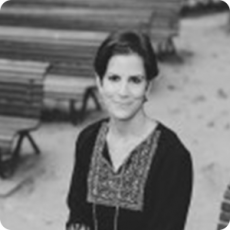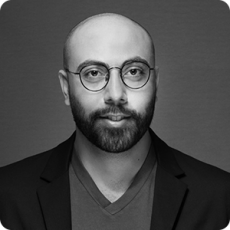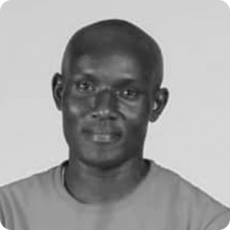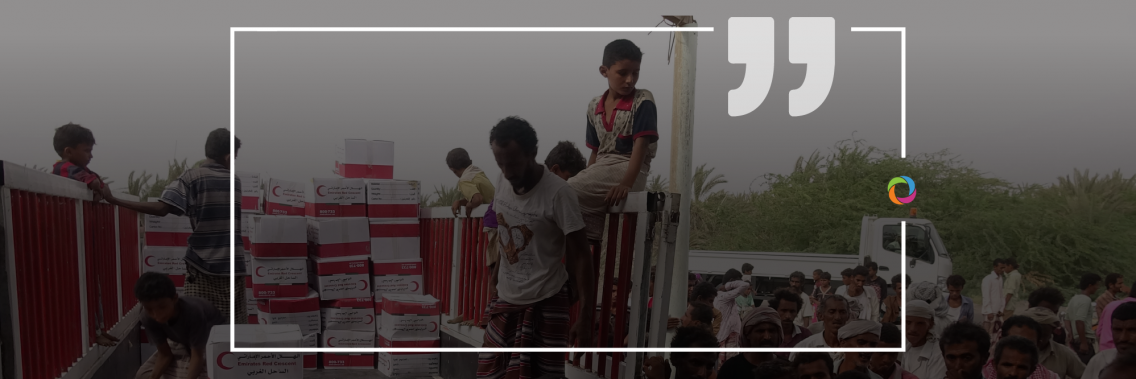Hard work, compassion, sleepless nights and a call for humanity – these are the key ingredients that make up a humanitarian aid worker. Today, we mark World Humanitarian Day – a global celebration of people helping people. On this special day, we would like to inspire you by sharing the experiences of some Humanitarian Aid Workers.
The experience of a humanitarian aid worker in brief…

“My parents were dispossessed from their homeland and consequently endured great hardship. They struggled and fought hard to make a life for themselves and for the right to return home one day and to rebuild their country. I have never lived “at home”. While we may not have been refugees in the strict legal sense of the word, we were so in every other sense. I therefore always knew that I wanted to work with people who, like we had been, are affected by war and conflict. When I began my Master’s degree at a university in Egypt, my focus lay on human rights law and I wrote a thesis on a refugee related issue. This was in 1998. During my research, I needed to do an interview with a representative from the UNHCR office in Cairo, Egypt, which happened to be located at the other end of the street from where I lived. At that meeting I learned that UNHCR was looking for interns to help them in their work with refugees. I felt that this was my chance to learn more about working with refugees. A few months later, several UN Volunteers (UNV) positions opened up at the same office and I was recruited. A year later, UNHCR needed an Arabic speaking protection officer in Baghdad in Iraq. Therefore, in 2000, Iraq was my first international assignment, starting a worldwide journey that has lasted for 17 years with UNHCR. At the time, my job was to carry out refugee status determination (RSD) interviews with refugees (a huge responsibility for anyone, never mind a young woman). I will always remember my first couple of years at the UNHCR office in Cairo, Egypt with a lot of affection and gratitude. During that period, my supervisor sent me to a regional UNHCR meeting to represent the office and speak about how we were undertaking RSD interviews for the Sudanese people. I was so excited about this opportunity I could not sleep the whole night before. This was also the assignment where I first came into close contact with refugees. As someone who was speaking to refugees every day, I heard detailed stories of the unspeakable horrors and suffering that they had been subjected to which had left them with deep scars. Many of them very much affected me on a personal level, and I remember having to take breaks sometimes in the middle of an interview for not to break down right then and there. At the same time, this assignment was the first to show me how unbreakable the human spirit is, how resilient it is, and the power of hope for a better future. It also has helped me put all the things I took for granted into perspective and to be more grateful. Some situations were hard because they took an emotional toll on me. For example, I was particularly affected by the Syrian refugee crisis. When I was deployed to Lebanon and Jordan in 2013 for seven months, I came face to face with refugees that I had a lot of common with me. I saw myself and my family in their faces. It really brought home to me how easy it would have been for their situation to have been mine. When this assignment come to a close and the madness of the everyday work ended and I allowed myself to feel what I had pushed into the background and I felt immense grief and sadness for several months. There is a myth in the humanitarian world that, with time, humanitarians get used to suffering. There is nothing further away from the truth. Even when you think you have seen it all, you will continue to be confronted with a situation that will touch you to the core.”

“I didn’t set out to become a humanitarian worker. Like many others, I just fell into it, and it doesn’t feel that long ago since I was a young man in 2006 studying at university when I saw some volunteers conducting an anti-drugs awareness session and decided to join them. It took me more than four years of voluntary work to decide that I wanted to make this my daily job and future career. It took me around ten years to win my first overseas mission. I volunteered with four organizations, worked with two INGOs and one UN agency in my country before going on overseas missions. Taking on my first mission as an international staff was completely different from working as national staff. It was a unique experience that broadened my horizons, expanded my knowledge, gave me a broader range of conceptions and helped me to understand what I wanted from this job. I’ve had my fair share of scrapes. My job has brought me near to death five times and put me in stressful situations that led to burn-out. But I’ve been lucky. The most challenging time was a few years ago when I was held hostage in North Syria by a conservative military group because I was working for an international NGO. It was a stressful experience, and it took me months to recover from the mental and emotional difficulties that I faced. My job made me believe that positive growth and resilience can happen following trauma and that humans are highly resilient and can persevere in spite of tragedy.”

“Immediately after completing college in 2010 and having undertaken a water engineering course, I was eager to be part of a team of like-minded individuals to help in the alleviation of poverty by using both the skills I had acquired skills and my potential. Being part of the problem solving and ensuring that each being has a basic human right for water, I imagined being part of the community (humanitarian) and serving people in need which forms the foundation of my faith. By understanding that anyone can be part of improving the community, I was open to understanding how other communities lead their lives and so I chose to pursue being a social worker in the field of Water Sanitation and Hygiene. I applied for the available vacancies, was successful and hence gained my first mission. It was a memorable experience with new people and the community at large. Establishing a link or a network that included all the necessary stakeholders and gaining an understanding about the practical situation in the locality (in my case, a rural setting) are skills which I still value. During my first international mission, the language barrier was the main headache but this did not last for long as I quickly adapted and leaned the language. Several unstable situations occurred that always resulted in the suspension of services, evacuations, etc. And involved decision making regarding the safety of staff and ensuring continuity of programming despite the challenging contexts. Additionally, these situations created emergencies that caused the affected communities to take a few steps backwards and which affected progress and interventions. There has been a reduction in funding or a decline in funding globally that has resulted in focusing only on meeting basic needs amid existing large gaps for the past 10 consecutive years.”
What skills are necessary to be a humanitarian aid worker?

“A good humanitarian worker is someone for whom this is not just a job but a calling. Often the personal sacrifice is quite high, so you need to have a “thick skin”. Making sure that you bring compassion and humanity into your work is very important, an ability that some colleagues tend to lose the longer they stay in this line of work. Knowing how to take care of yourself, learning to trust your instincts as they will be of service to you during tough situations, where a split-second decision is all that it takes for make or break. Lastly, I would add agility, diplomacy and emotional intelligence.”

“Humanitarian workers face many different situations that require different skills, so your success in humanitarian work will be limited without the ability to adapt to various conditions and to be an excellent communicator with strong critical thinking and problem-solving skills. While having a university degree is essential, I believe that it’s not the most important thing. This job requires skills and experience, and these things will come from learning and practicing. I always tell new humanitarian workers to learn how to: 1- promote an approach to change, 2 – present an argument, 3- articulate what they are trying to say concisely and 4 – inspire others with conviction.”
What are some of the things a humanitarian aid worker should give up?

“Give up on a comfortable way of life (as we are used to in our various home lives) and adapt to the mission setting (like field locations). Understand that, as a humanitarian worker, you should choose to be a careful extrovert (even if you don’t need to be on some occasions) and be alert.”

“Every job brings its own sacrifices but I am more interested in the attitudes that humanitarians should give up and the mind set required. Do not think that you are the one that is going to “save” people or that refugees and others fleeing conflict or wars are depending on you to rescue them. Often, it is not us that are the first line of responders but the communities and individuals themselves, grass root organizations, faith-based organizations and local authorities. Lose any sense of superiority, or “I know better what these people need to do” because you often do not. In fact, what you will realize is that you have a lot to learn, especially from the individuals and communities you are trying to help. Moreover, and as a piece of friendly advice, do not use humanitarian work to run away from your own problems or in order to avoid certain situations you do not want to face. It will have an impact on you and your work as a humanitarian, not to mention that this strategy will not work. Be aware of the story that you have told yourself about how the world, including war and responses, works because this work will challenge your frames of reference and your world view. For example, when I first became a humanitarian worker, I naively believed that humanitarian work was shielded from politics whereas humanitarian work is heavily influenced by politics, many types of politics.”
What is your advice for those who want to follow your path?

“The path is not linear. Do not be afraid to take risks and to venture outside your comfort zone. Perform regular check-ins with yourself along the way to see if this is still what you want to do, does it still correspond to what you want or need at that moment in your life? Do not beat yourself up about deciding to do something else. I say this because many humanitarians tend to be very hard on themselves and put their humanitarian work first, at the expense of other priorities.”

“This job is like any other job, it has positive and negative aspects. The humanitarian sector is not a happy landscape. It’s a new sector with many gaps and challenges. In all circumstances, it is important to know yourself and your ability to make wise decisions and be aware of your vulnerability to stress and burnout. Some organizations have toxic environments, contract and candidate favoritism happens, the gender gap exists at different levels and discrimination is present within many. Still, you will also witness a lot of exciting things and learn about communities, cultures, religions, countries, personalities and nationalities. You also change lives when you bring aid, educate children, empower youth, promote gender equality and build peace.”
Check out more than 370 job opportunities in the humanitarian aid sector here.

